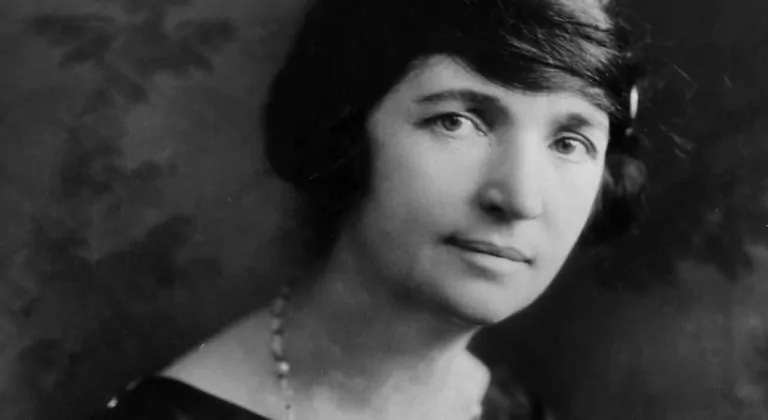EDITOR’S NOTE: The original title the editor gave this – “Margaret Sanger: Apostle of abortion and eugenics” – made it seem as if Sanger was a public advocate of both. While she was a public eugenicist, she publicly opposed abortion, even as (according to Ellen Chesler’s biography “Woman of valor: Margaret Sanger and the Birth Control Movement in America”) her clinics would sometimes, privately, refer women for abortions.
****
The largest abortion provider in the United States is an organization called Planned Parenthood. It receives money from the US federal government and various state governments. Planned Parenthood also has a presence in most other countries of the world including Canada. Like the US, the Canadian federal government financially supports this organization. In both countries such government funding is strongly opposed by pro-lifers.
The founder of Planned Parenthood was a woman named Margaret Sanger (1879-1966). She is an icon of leftists throughout the English-speaking world, though she is probably most popularly known as a promoter of birth control.
She was that, to be sure, but there is much more that should also be known about her. Sanger was a dedicated opponent of Christian principles and capitalism. Her legacy through Planned Parenthood continues to infect the world and influence countless people towards evil.
American author George Grant wrote an insightful biography of Margaret Sanger a few years ago entitled Killer Angel: A Short Biography of Planned Parenthood’s Founder Margaret Sanger. From this account it would appear that Margaret Sanger’s contribution to humanity has been extremely harmful.
Convert to socialism
Margaret Sanger was born as Margaret Higgins in Corning, New York in 1879, one of eleven children. Her home life was hard and unhappy, in large part because her father was a miserable person. He was a religious skeptic. Her mother was a Roman Catholic who had Margaret baptized and confirmed in the Roman Catholic Church in her early teens. In her mid-teens Margaret attended Claverack College. Here, Grant writes, she “plunged into radical politics, suffragette feminism, and unfettered sex.” Subsequently she worked briefly as a kindergarten teacher and then worked in a hospital, training to be a nurse.
In 1900 Margaret met a promising young architect named William Sanger. They married and had three children. William was a leftwing social activist. Margaret would accompany him to various leftwing meetings, and she became very excited about far-left ideas. As a result, she joined the Socialist Party.
Margaret then began writing for the Socialist Party newspaper and speaking on behalf of the Party to labor organization meetings. In the early 1900s the Socialist Party was a significant organization in American politics. Hundreds of locally-elected public officials were members of the Party, and it won 6 per cent of the national vote in the 1912 presidential election.
As time went on, Margaret increasingly neglected her family because of her devotion to leftwing activism. William, who had introduced her to that activism, became concerned. But it was too late for him to do anything. Grant states that:
Margaret told her bewildered husband that she needed emancipation from every taint of Christianized capitalism—including the strict bonds of the marriage bed. She even suggested to him that they seriously consider experimenting with various trysts, infidelities, fornications, and adulteries. Because of her careful tutoring in socialist dogma, she had undergone a sexual liberation – at least intellectually – and she was now ready to test its authenticity physically.
Nevertheless, William tried desperately to save the marriage.
At this time, fashionable leftwing intellectuals held meetings in the Greenwich Village district of New York City, and Margaret became a regular attendee. These intellectuals were noted for their practice of “free love”, but, Grant notes, “no one had championed sexual freedom as openly and ardently as Margaret.”
In a last ditch effort to save his marriage, William took his family to Paris. However, Margaret got bored of Paris and moved back to New York along with her children. The marriage was over.
In New York she founded a new periodical appropriately titled The Woman Rebel. Grant notes that its “first issue denounced marriage as ‘a degenerate institution,’ capitalism as ‘indecent exploitation,’ and sexual modesty as ‘obscene prudery.’”
England and eugenics
Due to the extreme content of her paper, Margaret was charged with the publication of lewd and indecent materials. Rather than face the charges she fled the US for England.
While in England, Margaret became enmeshed in the ideas of Thomas Malthus and his followers. Malthus was an early nineteenth century philosopher who promoted the belief that the world was facing a crisis due to overpopulation. Human population was, in his view, increasing much more rapidly than the availability of resources, so humanity was facing disaster. His followers basically wanted to restrict the growth of human population in order to prevent such a disaster.
In the early twentieth century, one of the major streams of Malthusian thinking was Eugenics, a view that the human race could be improved through selective breeding. That is, Eugenic supporters wanted to ensure that the supposedly best racial stocks reproduced while supposedly inferior racial stocks were inhibited from reproducing. Margaret became a strong promoter of Eugenics.
She also met and became friends with many of the leading leftwing intellectuals of Britain. Some of them became her lovers. Grant writes:
Free from what she considered “the smothering restrictions of marital fidelity,” she indulged in a nymphomaniacal passion for promiscuity and perversion.
Promoting Malthus
After a year in England, Margaret returned to the United States. She was able to generate enough public support that the charges against her were dropped. Then she embarked on a very successful cross-country tour promoting her ideas. However, her subsequent attempt to operate an illegal birth control clinic was shut down by the authorities.
After spending a few days in jail due to operating the illegal clinic, Margaret founded the American Birth Control League and its magazine, The Birth Control Review. This new organization would eventually evolve into Planned Parenthood.
Margaret and the American Birth Control League became very popular, receiving support and financial help from many prominent people. To further promote her beliefs, in 1922 she wrote an important book entitled The Pivot of Civilization that openly advocated Malthusian and Eugenic goals.
In 1925 Margaret hosted a conference in New York to promote Malthusian ideals and birth control. One achievement of this conference was the formalization of a loose federation of organizations supporting birth control. During the 1940s this organization would become known as International Planned Parenthood.
An unhappy life
Despite her notable achievements, Margaret was not personally happy. Grant says that in a desperate attempt “to find meaning and happiness, she lost herself in a profusion of sexual liaisons. She went from one lover to another, sometimes several in a single day.”
Although Margaret had publicly condemned marriage, in 1922 she married a wealthy oilman, J. Noah Slee. However, in order to marry Margaret, Slee had to agree to allow Margaret to sleep around. Through this marriage, Margaret got access to millions of dollars of funding for her cause.
During the 1930s Margaret had friendly ties with fellow Eugenic supporters in Germany. Grant explains:
Because of her Malthusian and Eugenic connections, she had willingly become closely associated with the scientists and theorists who put together Nazi Germany’s “race purification” program. She had openly endorsed the euthanasia, sterilization, abortion, and infanticide programs of the early Reich. She happily published a number of articles in The Birth Control Review that mirrored Hitler’s Aryan-White Supremacist rhetoric. She even commissioned her friend, Ernst Rudin, director of the Nazi Medical Experimentation program, to serve the organization as an advisor.
Despite those unsavory associations, Margaret’s star continued to rise after the Second World War. By the 1960s she was exceptionally famous, and her efforts were publicly supported by such prestigious leaders as John D. Rockefeller, Harry Truman and Dwight Eisenhower.
Personally, though, she continued to have problems. On top of her immoral lifestyle, she involved Planned Parenthood in financial scandals. Grant says that:
She often spent Planned Parenthood money for her own extravagant pleasures. She invested organizational funds in the black market. She squandered hard-won bequests on frivolities. And she wasted the money she’d gotten “by hook or by crook” on her unrestrained vanities.
Grant also points out one more notable aspect of Margaret’s personality:
Throughout her life, Margaret Sanger developed a rakish and reckless pattern of dishonesty. She twisted the truth about her qualifications as a nurse, about the details of her work, and about the various sordid addictions that controlled her life. Her autobiographies were filled with exaggerations, distortions, and out-and-out lies.
Needless to say, she was not a woman of good character. Margaret Sanger died on September 6, 1966.
Conclusion
Planned Parenthood is a large and powerful organization in both Canada and the United States. In the US that organization is commonly in the news due to its controversial activities and agenda. As such, Christians are often confronted with the legacy of Margaret Sanger even today. She is gone but her agenda is aggressively pursued by her disciples, and we see it today as a largely evil agenda of abortion and population control. Margaret Sanger made an unmistakable mark on the world that continues unabated in the contemporary abortion policies of many countries.
Michael Wagner’s latest book, Leaving God Behind, about Canada’s Christian roots, can be purchased here.











